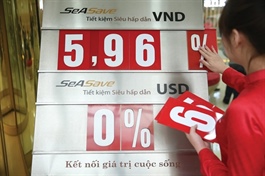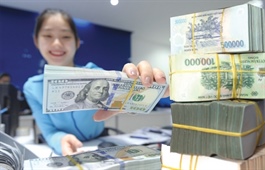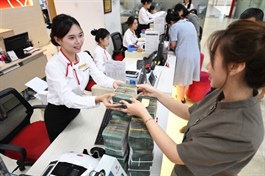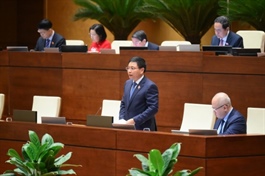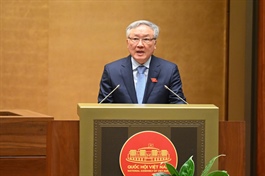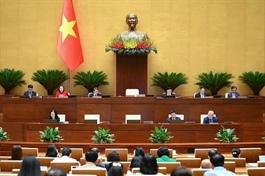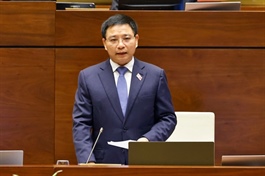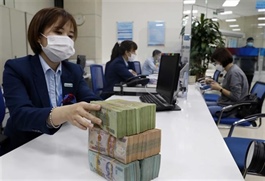IFC can transcend middle-income gap
IFC can transcend middle-income gap
The submission of a draft resolution on Vietnam’s international financial centre (IFC) to the National Assembly marks a pivotal moment, heralding a new developmental era for Vietnam.
Introduced on June 11, the resolution lays essential groundwork, strategically positioning the IFC to help Vietnam transcend the middle-income trap and achieve sustained double-digit economic growth from 2026 to 2045.

Tran Thi Thuy Ngoc, financial services leader Deloitte Vietnam |
The draft resolution outlines a clear governance framework, comprising six chapters and 35 articles, with the IFC Steering Committee directly led by the prime minister. It empowers the government to address emerging issues by issuing decrees beyond standard legislative frameworks, underscoring a robust political commitment and decisive leadership aimed at aligning closely with international standards and market dynamics.
This governance approach mirrors international best practices. In Kazakhstan, the AIFC Management Board, directly supervised by the president, demonstrates the efficacy of high-level oversight in fostering rapid implementation and crisis responsiveness, reinforcing investor confidence.
Moreover, beyond governance, the draft resolution introduces bold fiscal incentives to attract global talent, including significant exemptions from corporate income tax and personal income tax, reflecting a visionary approach similar to practices in leading IFCs like AIFC in Kazakhstan and DIFC in Dubai.
Coupled with streamlined administrative procedures, visa exemptions, and a favourable living environment, these measures aim to position Vietnam as an appealing destination for top international professionals.
Given the rapid evolution and diversification of financial products (fintech, digital assets, and carbon credits), the draft resolution advocates for a dynamic legal framework, with “laws as frameworks, regulations as details”.
This principle enables financial regulators to swiftly adapt to new market demands while ensuring systemic stability.
This flexible regulatory approach has proven successful internationally. Singapore’s Monetary Authority, for instance, swiftly updates financial service portfolios through secondary regulations. Similarly, the DIFC and AIFC regularly adjust regulatory codes without awaiting legislative amendments, thus remaining agile and responsive to market developments.
Foreign currency management is a critical yet sensitive issue addressed explicitly in the draft. It advocates a controlled liberalisation approach, ensuring global connectivity without compromising domestic financial stability.
Practices in centres such as Singapore (with SGD transaction limits), DIFC (prohibiting UAE Dirham transactions), and Malaysia’s Labuan (imposing a currency ceiling) illustrate successful models of balancing both openness and control.
Vietnam’s approach mirrors this careful balance, promoting international capital inflows while maintaining safeguards for the domestic currency, thereby enhancing macroeconomic stability and risk management capabilities.
Investor confidence hinges significantly on legal clarity and dispute resolution mechanisms. The draft introduces dual dispute resolution systems, including specialised courts applying common law and operating in English, creating a familiar legal oasis for foreign investors. International arbitration options complement this, ensuring flexibility and fairness.
The success of this model is evident in hubs such as the DIFC and AIFC, where independent courts using common law and English, staffed by international judges, have effectively reduced investment risks associated with legal culture shock.
Encompassing 13 targeted policy areas, the draft resolution presents an ambitious yet practical vision tailored to Vietnam’s context, addressing coordination mechanisms, legal frameworks, foreign exchange policies, and judicial systems.
Achieving this vision requires rigorous governmental engagement in legal reform and infrastructure investment, private sector readiness to enhance competitiveness, and public awareness of the IFC’s long-term benefits – from economic growth and high-quality employment to Vietnam’s strengthened global standing.
Establishing an IFC is a long-term endeavour. The foundational steps detailed in the draft resolution are critical building blocks towards realising Vietnam’s ambitious aspirations. Meticulous implementation, continuous evaluation, and agile adjustments will determine its ultimate success as both a global financial destination and a catalyst for Vietnam’s broader economic transformation.
- 09:34 24/06/2025



